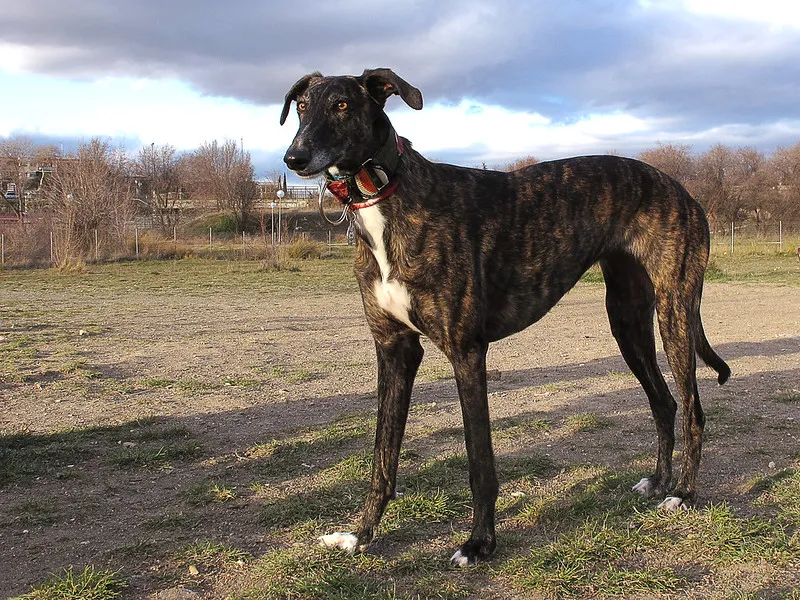
galgos
apareció en el viejo galpón de los ferrocarriles,
medio oculto entre los cardos, enfurecido,
gritando contra el viento y arañándose la cabeza,
esas cosas pasan acá, pasan seguido, me dijo,
las tranqueras dan chirridos, los pájaros te matan,
a lo lejos los chicos cabalgan a lomo de los galgos,
el sol les da de lleno, pero está bien, no importa,
nadie muere de eso, acá las cosas son diferentes,
estamos abandonados en el medio del campo,
el polvo se nos pega a los ojos, incluso a la mirada,
ya casi no abrimos la boca, y adentro hay cosas:
hay gusanos, moscas, sanguijuelas, escarabajos,
lo vimos gesticular, moverse con torpeza, escupir,
cantaba canciones, maldecía y saludaba amablemente,
acá no se puede andar, los galgos te comen las piernas,
te olfatean desde doscientos o trescientos metros,
y te comen las piernas, llegan con los ojos rojos,
te muestran los dientes y te encaran, te torean,
andan comiendo de la basura, ratas, bichos muertos,
agarran a las gallinas en manada, y te huelen de lejos,
lo mejor es no andar de noche, está muy alto el pasto,
y está todo roto: las ventanas, los juegos de la plaza,
los camiones, los alambres de púa, las vías del tren,
los galgos toman agua en los pozos de la calle
y en un costado descansan los chicos, inmóviles,
no queda nada acá, en otra época había calandrias,
había teros, horneros, flores silvestres, comadrejas,
ahora nos quedan los galgos y algunas aves rapaces,
si no te comen las piernas, te picotea un chimango,
decían que era el agua, la comida, y así quedaron,
andan con la ropa rota, a tientas, a veces se arrastran,
y se quedan días con la boca abierta al sol o bajo la lluvia,
lo mejor es no mirarlos, no pasar cerca, no escuchar,
te agarran las botas, te meten para abajo del barro,
y de ahí, a tu edad, no te saca nadie, nunca más,
no quedan ni los huesos, no te recuerda nadie,
estamos abandonados, a la noche no hay ni una luz,
vuelan algunas lechuzas blancas, algunos murciélagos,
y si salieras te llenarías de espinas, de latas viejas,
o te caerías en una zanja, o te esperarían en la esquina,
lo mejor es cerrar bien la puerta, emborracharte,
o volarte la cabeza de un tiro, directamente, sin vueltas,
es mejor pudrirse adentro, tirarse unas mantas encima,
abrazarse con quien esté cerca, morir pacientemente,
o esperar a que llegue la mañana y asomarse a la ventana,
ver el rocío o la helada o la lluvia o el polvo o la niebla,
y ellos siempre allí, montados en los galgos, los ojos rojos,
tomando agua de los pozos del asfalto, rodeando la casa.
[ENG - Translated with Deepl. The translation of poetry is very complex, therefore, in this case, it is not intended to have literary value, but only to serve as an orientation for reading.]
galgos
appeared in the old railroad shed,
half hidden among the thistles, enraged,
screaming against the wind and scratching his head,
these things happen here, they happen often, he told me,
the gates creak, the birds kill you,
in the distance the boys ride on the back of the galgos,
the sun hits them full on, but it's okay, it doesn't matter,
nobody dies from that, here things are different,
we are abandoned in the middle of the field,
the dust sticks to our eyes, even to our gaze,
we hardly open our mouths anymore, and inside there are things:
there are worms, flies, leeches, beetles,
we saw him gesticulate, move awkwardly, spit,
he sang songs, cursed and greeted kindly,
here you can't walk, the galgos eat your legs,
they sniff you from two or three hundred meters away,
and they eat your legs, they come with red eyes,
they show their teeth and they face you, they gore you,
they go around eating garbage, rats, dead bugs,
they grab the chickens in herds, and smell you from afar,
it's best not to walk around at night, the grass is too high,
and everything is broken: the windows, the playground equipment,
the trucks, the barbed wires, the train tracks,
the galgos drink water in the wells of the street
and on one side rest the children, motionless,
there is nothing left here, in another time there were calandrias,
there were teros, horneros, wild flowers, weasels,
now we are left with galgos and some birds of prey,
if they don't eat your legs, you get pecked by a chimango,
they used to say it was the water, the food, and that's how they stayed,
they walk around with their clothes torn, groping, sometimes they crawl,
and they stay for days with their mouths open in the sun or rain,
the best thing to do is not to look at them, not to pass by, not to listen,
they grab your boots, they pull you under the mud,
and from there, at your age, nobody gets you out, never again,
not even the bones are left, no one remembers you,
we are abandoned, at night there is not even a light,
a few white owls fly, a few bats,
and if you went out you'd be full of thorns, of old cans,
or you'd fall into a ditch, or they'd be waiting for you at the corner,
the best thing to do is to lock the door, get drunk,
or blow your head off with one shot, straight away, without any twists and turns,
it's better to rot inside, throw some blankets over yourself,
cuddle with whoever's around, die patiently,
or wait for morning to come and look out the window,
watch the dew or the frost or the rain or the dust or the fog,
and they're always there, riding the galgos, red-eyed,
drinking water from the asphalt wells, surrounding the house.
Fotografía de jacinta lluch valero, CC BY-SA 2.0.
Photograph by jacinta lluch valero, CC BY-SA 2.0.
